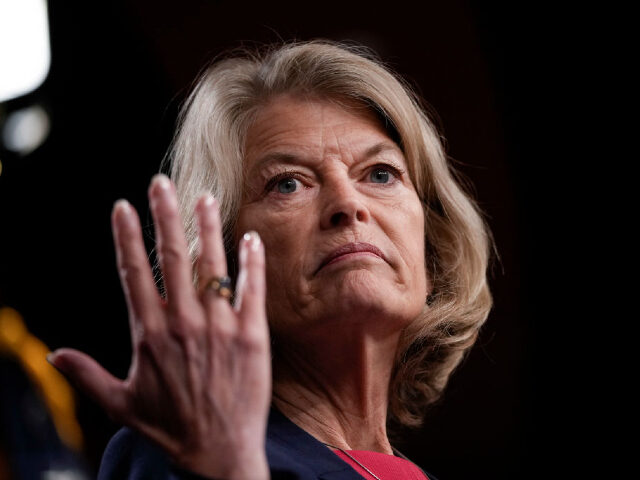Twenty-one-year incumbent Sen. Lisa Murkowski (R-AK) is trying to overcome her highly controversial 2021 pro-impeachment vote for former President Donald Trump in a tied reelection bid against Trump-endorsed Kelly Tshibaka.
Murkowski, who was given her Alaskan Senate seat by her father 21 years ago, is the only pro-impeachment Republican senator up for reelection in 2022.
A total of seven GOP senators broke with party ranks in 2021 and voted with Democrats. Two pro-impeachment GOP senators are retiring after 2022: Sens. Richard Burr (R-NC) and Pat Toomey (R-PA). Four Republican senators are not up for reelection this cycle. Those four include Sen. Bill Cassidy (R-LA), Susan Collins (ME), Mitt Romney (UT), and Ben Sasse (NE).
That leaves Murkowski alone in the Senate to face the ire of voters, who took action across the nation in GOP primary House races by ousting 80 percent of pro-impeachment members. Only two pro-impeachment Republicans survived to the general election after Rep. Liz Cheney (R-WY) and Jaime Herrera Beutler (R-WA) were defeated by Trump-endorsed candidates Harriet Hageman and Joe Kent, respectively.
Tim Murtaugh, adviser to Tshibaka, told Breitbart News Murkowski’s impeachment vote did not reflect the views of Alaskans.
“When Lisa Murkowski voted to remove Donald Trump from office after he was already gone, she sided with her D.C. insider friends once again, rather than reflecting the views of Alaskans,” Murtaugh explained. “President Trump’s pro-energy policies were fantastic for Alaska workers and the state went for Trump by double digits twice. Instead, Murkowski is now a full-on Biden ally, propping up his energy-annihilating agenda even though it’s crushing Alaska working families.”
Ousting Murkowski in Alaska is likely a bit more challenging. Though Murkowski is running for reelection in a state that voted by double digits for Trump in 2020 and therefore should have theoretically lost to Trump-endorsed Kelly Tshibaka in the open primary on August 16, Alaska is a state where ranked-choice voting improves the incumbent’s advantage. The ranked-choice voting system was instituted in 2020. The way it works is as follows:
All candidates from all parties appear on the ballot together in the August primary. The top four vote-getters regardless of party then advance to the general election, and there voters are given the opportunity to pick their top choice, as well as their second and third choices. If no candidate in the first round of voters’ first choices gets 50 percent of the vote, the last place candidate’s second choices are distributed across the remaining three candidates to see if someone can get across the majority threshold. If that fails again to produce a majority vote-getter, then a third round is conducted where the third place candidate’s votes are redistributed according to second choices between the remaining two candidates.
The ranked-choice voting system appeared to work to the advantage of Murkowski in the open primary because the establishment senator was aided by Democrat votes, the only path Murkowski has to win reelection in November unless Republicans and Democrats continue to coalesce behind Tshibaka.
Republicans and Democrats have coalesced behind Tshibaka. Since the open primary on August 16, three former U.S. Senate candidates have dropped out of the race and thrown support behind Tshibaka. The endorsements are a key factor in Tshibaka’s ability to overcome Murkowski’s incumbent advantage.
Murkowski is not just aided by the state’s voting system. She is strongly backed by Sen. Mitch McConnell (R-KY), who controls a super PAC that is funding Murkowski’s reelection to the tune of $1.7 million.
Adviser to the Tshibaka campaign, Mary Ann Pruitt stated:
Remember that McConnell said he wasn’t going to spend money on this race because he didn’t think it was competitive. But now there are two polls showing a dead heat and so he’s gone on the attack with this nonsense. Kelly Tshibaka has been going after government insiders for most of her career, so it’s no wonder that the insiders fight back sometimes.
It is still possible Murkowski will be voted out of office in November, and she seems to know it. “I may not be re-elected,” Murkowski told the New York Times in April. “It may be that Alaskans say, ‘Nope, we want to go with an absolute, down-the-line, always, always, 100-percent, never-question, rubber-stamp Republican.'” She continued:
And if they say that that’s the way that Alaska has gone — kind of the same direction that so many other parts of the country have gone — I have to accept that. But I’m going to give them the option… Maybe I am just completely politically naïve, and this ship has sailed. But I won’t know unless we — unless I — stay out there and give Alaskans the opportunity to weigh in.
Recent polling shows Tshibaka and Murkowski are tied. The polling takes into account Alaska’s ranked-choice voting. Tshibaka led Murkowski on the first ballot by 7.9 points and on the second by 9.3 points. On the third ballot, Murkowski took the lead over Tshibaka by 0.2 percent, a statistical tie. Democrat Pat Chesbro received 13.1 percent on the first ballot and 13.9 percent on the second ballot before becoming ineligible for the third ballot.
“I think it is really becoming clear that Alaskans across the entire spectrum are uniting behind this campaign,” Tshibaka told campaign supporters after the released polling.
Follow Wendell Husebø on Twitter @WendellHusebø. He is the author of Politics of Slave Morality.

COMMENTS
Please let us know if you're having issues with commenting.